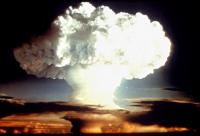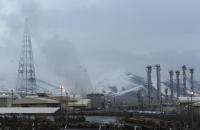-
Netanyahu to discuss with Trump “various ways” to do away with Iran deal
The Israeli prime minister, Benjamin Netanyahu, has said he planned to discuss with Donald Trump “various ways” to undo the Iran nuclear deal, after the president-elect moves into the White House next month. “I think what options we have are much more than you think,” Netanyahu told CBS’s 60 Minutes in an interview which was aired on Sunday. “Many more. And I’ll talk about it with President Trump.”
-
-
Tearing up Iran nuclear deal would be “disastrous”: Former IAEA director
Hans Blix, the former head of the International Atomic Energy Agency, said it would be disastrous for the world if the United States withdrew from the Iran nuclear agreement, but warned that President-Elect Donald Trump would be unlikely to listen to advice from the British government on the advantages of keeping the deal.
-
-
Trump may release documents with secret details of Iran deal
Documents containing previously-unpublished details of the nuclear deal with Iran could be released after Donald Trump is inaugurated as president next month. The documents, which the Obama administration has refused to release publicly, are stored in special rooms in the Capitol complex called Sensitive Compartmentalized Information Facilities (SCIFs) that are normally used for storing top-secret information. However, the Iran documents are not officially designated as classified, and therefore could be released by the Trump administration relatively easily.
-
-
Former IAEA deputy director criticizes nuclear agency’s Iran investigations
Olli Heinonen, the former deputy director-general of the International Atomic Energy Agency has criticized the agency for “reduc[ing] the level of transparency and details in its reporting” on Iran’s nuclear program, making it “practically impossible” to confirm that Iran is complying with the terms of the nuclear deal.
-
-
Expert: Iran falsely accusing U.S. of violating nuclear deal to gain more concessions
Iranian warnings against the passage of the Iran Sanctions Act (ISA) reflect “a broader strategy” in pursuit of additional sanctions relief, a senior analyst at the Foundation for Defense of Democracies, wrote in a policy brief on Saturday. The ISA was originally passed in 1996, targeting Iran’s energy sector and expanding U.S. secondary sanctions. The House of Representatives overwhelmingly approved a ten-year extension of the act earlier this month. In order to be renewed, the legislation must now pass the Senate and be signed into law by President Barack Obama.
-
-
Trump’s U.S. could give up the fight to stop nuclear arms from spreading
With a few notable exceptions, Democratic and Republican presidents alike have generally tried to restrain if not reverse nuclear proliferation since nuclear weapons came into existence. There were failures – Israel, India, Pakistan, North Korea — but the overall thrust of global politics, under U.S. leadership, has been toward nonproliferation. The United States is far from the sole global arbiter of nuclear status, but Washington wields immense power on nuclear issues. This may change now as Trump, throughout his campaign, seemed unconcerned about the further spread of nuclear weapons. The nonproliferation regime is flawed, sometimes unfair, but ultimately functional. Under the Trump administration, however, the one nation that has done more to restrain proliferation than any other might yet destroy the entire fragile edifice.
-
-
IAEA says Iran has violated terms of nuclear agreement -- again
The UN’s nuclear watchdog, the International Atomic Energy Agency (IAEA), said Wednesday that for the second time, Iran has exceeded the 130 metric ton threshold for heavy water, which is used to cool reactors that can produce weapon-grade plutonium. In February, the IAEA has cited Iran for the first time for producing more heavy water than allowed by the nuclear deal.
-
-
Russia’s ultimatum to US: Reduce commitment to NATO, lift sanctions – or nuclear deal is off
The Kremlin, in an unprecedented series of ultimatums on Monday, said Russia would suspend an agreement it had signed with the United States to turn weapons-grade plutonium into nuclear reactor fuel unless the United States rescinds the sanctions imposed on Russia because of its annexation of Crimea – and also cuts its military commitments to NATO. The Kremlin said that both the economic sanctions and the U.S. military commitments to its NATO allies are “unfriendly” acts to ward Russia.
-
-
The apartheid bomb: First comprehensive history of South Africa's nuke program
The Institute for Science and International Security has today (Friday) released a new book, Revisiting South Africa’s Nuclear Weapons Program: Its History, Dismantlement, and Lessons for Today, by David Albright with Andrea Stricker. It is the first comprehensive, technically oriented history of South Africa’s nuclear weapons program and its dismantlement. The lessons of this dynamic and complicated nuclear weapons program remain valid today. “Although none of the nine states that currently possess nuclear weapons appears on the verge of following South Africa’s example, the South African case contains many valuable lessons in non-proliferation, disarmament, export controls, and verification,” the Institute says.
-
-
Colin Powell leaked e-mail: “Israel has 200 [nukes], all targeted on Tehran”
Former secretary of state Colin Powell, in a leaked e-mail, says that Israel has 200 nuclear weapons. Powell sent the e-mail to a colleague last year, and it was obtained by the hacking group DCLeaks and published on LobeLog, a foreign policy blog. Intelligent experts, historians, and journalist trying to estimate the size of Israel’s nuclear weapons arsenal begin with estimating the size of the Dimona reactor, which went on line in 1962, and the amount of plutonium that can be extracted from the reactor’s spent uranium rods. In the literature, the number of nuclear weapons Israel is estimated to have ranges from 90-100 to 400.
-
-
N. Korea’s test of miniaturized warhead, submarine-launched ballistic missile, are game changers
North Korea has conducted its fifth nuclear test last night, marking the 68th anniversary of the nation’s founding. Military analysts say the test shows a worrisome improvement in North Korea’s nuclear capabilities: It was the most powerful nuclear test to date, with a 10-kiloton yield – slightly smaller than the yield of the bomb dropped on Hiroshima, estimated to have been between twelve and eighteen kilotons. The warhead tested in the explosion was miniaturized, indicating that North Korea now has the capability to mount a nuclear warhead on a missile. Last night’s test, together with North Korea’s proven progress in launching ballistic missile from submarines, mean that the country is getting closer to possessing a nuclear arsenal capable of hitting the United States.
-
-
U.S. violating nonproliferation agreement: Nuclear experts

More than two dozen nuclear experts, including former U.S. officials under the six preceding presidents of both parties, accused the Obama administration of violating a 2012 nonproliferation agreement to end exports to Europe of bomb-grade, highly enriched uranium (HEU) for production of medical isotopes. The administration proposes to export sixteen pounds of nuclear weapons-grade uranium metal to France to produce medical isotopes in Belgium and the Netherlands.
-
-
Iran received secret exemptions from complying with some facets of nuclear deal

The nuclear deal between the P5+1 powers and Iran – the official named is the Joint Comprehensive Plan of Action (JCPOA) — placed detailed limitations on facets of Iran’s nuclear program that needed to be met by Implementation Day, which took place on 16 January 2016. Most of the conditions were met by Iran, but some nuclear stocks and facilities were not in accordance with JCPOA limits on Implementation Day. In anticipation, the Joint Commission had earlier and secretly exempted them from the JCPOA limits. “Since the JCPOA is public, any rationale for keeping these exemptions secret appears unjustified,” say two experts. “Moreover, the Joint Commission’s secretive decision making process risks advantaging Iran by allowing it to try to systematically weaken the JCPOA. It appears to be succeeding in several key areas.”
-
-
North Korea creates specials nuclear backpack units to infiltrate the South
North Korea has established a special infantry unit whose soldiers are being trained for a one-way mission: in the event of war with South Korea, they will infiltrate the South carrying nuclear devices in backpacks and detonate their weapons in the middle of population centers. North Korean military issued calls to the nation’s soldiers to become human “nuclear arsenals” in the event of war in the region. Military analysts said the units are, in effect, suicide squads, resembling the Japanese kamikaze pilots sent to attack Allied warships toward the end of the Second World War.
-
-
Former senior Obama official: Inaction in Syria result of desire to keep Iran deal alive
The White House’s failure to stop the ongoing slaughter perpetrated by the Syrian regime of Bashar al-Assad stems from President Barack Obama’s “desire to accommodate Iran” so that last year’s nuclear deal will extend past his administration, the president’s former top Syria adviser charged.
-
- All
- Regional
- Water
- Biometrics
- Borders/Immig
- Business
- Cybersecurity
- Detection
- Disasters
- Government
- Infrastructure
- International
- Public health
- Public Safety
- Communication interoperabillity
- Emergency services
- Emergency medical services
- Fire
- First response
- IEDs
- Law Enforcement
- Law Enforcement Technology
- Military technology
- Nonlethal weapons
- Nuclear weapons
- Personal protection equipment
- Police
- Notification /alert systems
- Situational awareness
- Weapons systems
- Sci-Tech
- Sector Reports
- Surveillance
- Transportation
Advertising & Marketing: advertise@newswirepubs.com
Editorial: editor@newswirepubs.com
General: info@newswirepubs.com
2010-2011 © News Wire Publications, LLC News Wire Publications, LLC
220 Old Country Road | Suite 200 | Mineola | New York | 11501
Permissions and Policies
Editorial: editor@newswirepubs.com
General: info@newswirepubs.com
2010-2011 © News Wire Publications, LLC News Wire Publications, LLC
220 Old Country Road | Suite 200 | Mineola | New York | 11501
Permissions and Policies
